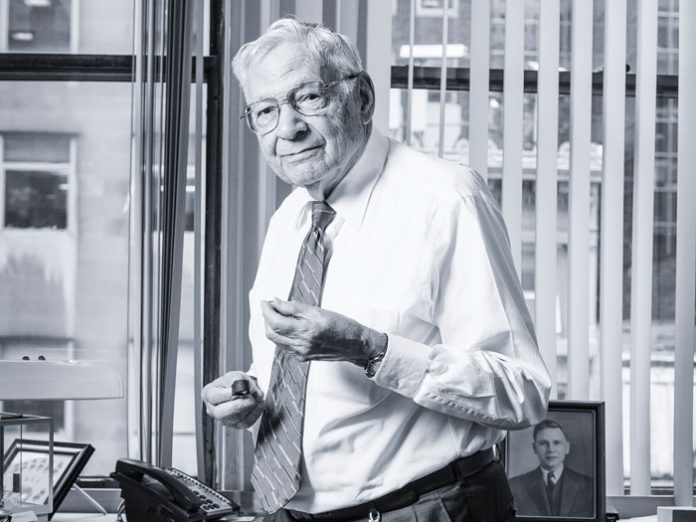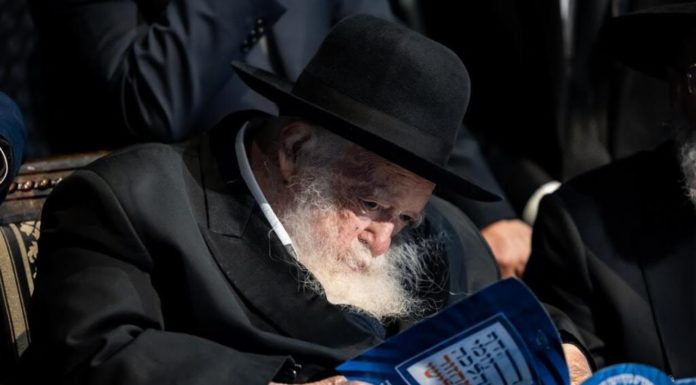It began, as many stories do, with an email:
I have a story you might be interested in. My father, Hector Goldman, 94 years old, was court-martialed during World War II for “fraternizing with the enemy.” It’s just that the “enemy” consisted of Jewish concentration camp survivors. He was an interpreter for a three-star general and sat in on truces with the Germans and Russians. We have most of the paperwork, and my mom and dad are of sound mind and body. They live in Riverdale if you want to meet him.
Best, Edward Goldman
While I prefer not to travel to conduct interviews, I sensed that this story was unusual. After all, there were many Jewish soldiers fighting for the Allies who helped liberate the German death camps, but I’d never heard of any who had been court-martialed. What was the outcome of this trial, and how had it affected the course of Goldman’s life?
Mr. Goldman was waiting for me with a huge smile at the door to his apartment on a tree-lined street in Riverdale. His wife, Gisele, whom he married in 1948, graciously offered me a cold drink. I ended up sitting with the Goldmans and their son, Edward (they also have two daughters), for almost two hours as they shared an unforgettable tale of courage and heroism, backed up by a collection of documents, photographs, and newspaper clippings amassed over the years, as well as a number of mementos including the prestigious Liberty Award.
Although well into his tenth decade, Mr. Goldman is remarkably sharp and spry, with an agility that belies his years. He recalls every detail of the infamous winter of 1944, the bitterest winter that Europe had seen in 50 years. It was so cold that it was impossible for the soldiers to pull the triggers on their rifles or even dig new foxholes; instead, the Americans hid in the foxholes that had been dug by the retreating Germans.
But let’s start at the beginning. Born on September 9, 1924, in Antwerp into a family of prosperous diamond dealers, Hector, the middle of three sons, attended the local public school and went to Talmud Torah in the afternoon.
When the Germans invaded Poland on September 1, 1939, the Jews in Belgium were aware of what had happened, but the rumblings of war seemed very far away from their peaceful lives. Then, on May 10, 1940, the Nazis, who had set their sights on the Netherlands, invaded Belgium over the course of only a few days, meeting little resistance from the Belgian army. Within weeks, France, Holland and Belgium were overrun with German soldiers.
“At first they were polite and left us alone,” Hector recalled. “It was in their best interests to remain on good terms with the Belgian citizens as they wanted to learn about our defenses and strengthen their hold on the country.”
While the Nazi killing squads were murdering tens of thousands of Jews in Lithuania, Austria and Poland, the Jews of occupied Belgium remained untouched. In fact, the Wehrmacht soldiers politely tipped their helmets, helped little children cross the street, and did not interfere in their daily lives. But that was just the calm before the storm.
Fifteen-year-old Hector, along with his 17-year-old brother, were sent away to Ostend, a seaside town in West Flanders, from where they were ferried to Dover, across the English Channel. The Belgian government’s plan was to save the youth and then induct them into the Belgian army in exile.
“We packed our bags and parted from my parents and younger brother. I got very sick during the trip and had to be hospitalized in a small country hospital along our route,” Mr. Goldman told me. “I remained there for several days, until my brother, of blessed memory, burst into my room and said, ‘Hector, our convoy is leaving! Should I stay with you or go with the others?’ I was too sick to go myself, but I didn’t want my brother to forfeit his chance for safety, so I told him to go off with the others and save his life.”
Tragically, that was the last time he ever saw his brother, who was killed in Ostend when Nazi bombers strafed the port, nearly annihilating the group of young people as they prepared to board the ships to cross the channel.





















